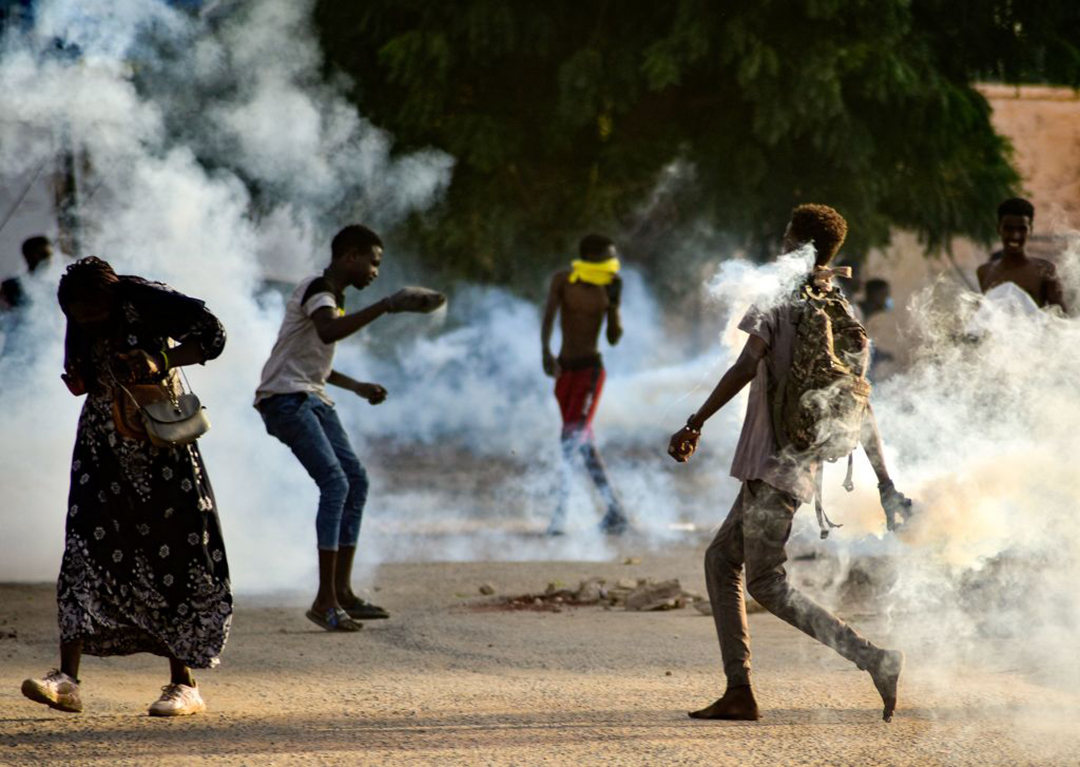Sudan Coup Sparked by Fear of Losing Power, Economic Interests
ADF STAFF
Weeks after a military coup in Sudan, street protests continue to rage, and outside mediators are trying to negotiate a return to stability. Questions remain about what led to the coup and what the future holds for the country of 44 million.
Roots of the Coup
The October 25 coup happened less than a month before civilian leaders were due to take control of the Sovereignty Council, the joint military-civilian power-sharing structure put in place after the ouster of Omar al-Bashir in 2019.
Under the agreement, the chairmanship of the Sovereignty Council was to pass to civilian control on November 17 for the 18 months leading up to 2023 elections. Instead, the council’s then-chairman, Gen. Mohammed Fattah al-Burhan, dissolved it and arrested civilian leaders, including Prime Minister Abdalla Hamdok.
Analysts believe some in the military were fearful of ceding power.
“They lived under the threat of losing everything,” Roland Marchal, a researcher at the Centre National de la Recherche Scientifique, told The Africa Report. “They felt that the noose was tightening and probably wanted to act before it was too late.”

Civilian members of the council had begun investigating abuses by the military’s Rapid Support Forces (RSF) and had started taxing some of the military’s business interests. A purge of corrupt military members also was possible.
“This was not only exposing and uprooting the network of companies owned by the Islamists forced out of power in 2019, but also the tentacles of the commercial empires owned by senior generals,” Alex de Waal, an expert in East African affairs, wrote for BBC. “Mr. Hamdok had become increasingly outspoken in his criticism of the military entanglement in the economy.”
Military Business Interests
After launching the October 25 coup, Sudan’s military leadership quickly shut down efforts to root out corruption.
One such effort was a committee established after the 2019 revolution with the mandate to break the al-Bashir regime’s control over key assets and natural resources and return them to the benefit of Sudan’s citizens.
In 2020, the committee reclaimed vast amounts of agricultural land it said had been illegally claimed by members of al-Bashir’s government, and $1.2 billion in assets from Abdel Basset Hamza, a former junior military officer who held stakes in hotels, the Afra Mall and telecommunications companies.
“These were people who organized some of the largest money-laundering operations on the planet. We are now hunting the missing billions,” one of the committee’s senior officials, Wajdi Saleh, told the BBC months before the coup. Saleh was arrested October 25.
From farm fields to oil fields, Sudan’s military is deeply involved in the country’s economy, in some cases using those same economic interests to fund operations outside the government budget. That includes the RSF run by Gen. Mohammed Hamdan Dagolo. Dagolo, also known as Hemedti, has been largely silent since the coup.
Military-owned companies are exempt from paying income taxes, which increases the country’s financial problems.
At least one military-owned operation, Defense Industrial Systems, agreed in March to turn its civilian operations over to the post-coup government and transition to a public company. It’s unclear where that transition stands now.
According to analyst Madgi el-Gizouli of the Rift Valley Institute, the coup grew out of the military’s unwillingness to make more concessions to civilian leadership.
“They calculated that this would allow them to overcome the protest movement and have veto power over the transition,” el-Gizouli told the International Crisis Group. “Of course, the relationship in the transition remained difficult. They didn’t really have complete veto power. They had to make concessions.”
Fractures within the civilian side of the transitional Sovereignty Council gave the military the space it needed to launch the coup, el-Gizouli said.
Russian Interests
The putsch has been largely condemned by the international community, yet one country — Russia — has refused. Russia signed a military cooperation agreement with Sudan after al-Bashir’s overthrow and, in 2020, agreed to a deal to build a Russian naval base at Port Sudan.
Before the coup, the civilian members of the Sovereignty Council sought to change the conditions of that agreement, delaying action on the Russian base.
The military regime might speed up the process of building the Russian naval base, according to analyst Kirill Semenov, a nonresident member of the Russian International Affairs Council.
Russia also has other interests at stake in Sudan: The Kremlin-backed private military contractor Wagner Group has been active in Sudan since al-Bashir invited it to train the nation’s military in 2017. Wagner-related mining companies came afterward as they have in other African nations.
What’s Ahead
The military government led by al-Burhan faces strong opposition from the government bureaucracy, which has been calling for strikes, and from civilians demanding that al-Burhan restore the transition to civilian rule.
After decades of dictatorship, Sudan’s people are making it clear they want the military to relinquish its grip on the country.
“They do not grant him their consent,” el-Gizouli said. “You need an element of consent to govern, and I think he will face serious problems manufacturing that.”


Comments are closed.